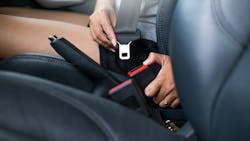Menefee: The Safety-related Parts Backorder Conundrum
Every shop I have run into lately has told me the same thing, and my shop is no different: They have a vehicle that is almost complete, but they cannot finish the vehicle because they are missing a seatbelt, airbag, or a component of the ADAS/SRS system. Since they are missing a critical part to make the vehicle safe, they are telling the customers they cannot release the vehicle because of the liability risk. We are all in the same boat with these issues. But the question we need to be considering is what if the customer demands the release of their vehicle without it being complete. What should shop management do?
When I have posed this question to other shop owners and managers, I have gotten the same answer: They cannot release the vehicle because of the liability risk, and they always cite the John Eagle case. I am fine with referencing that case, but I think there are some major differences when discussing a repair that was completed incorrectly versus a repair that is not complete. As a shop, we need to be prepared if a customer demands their vehicle back, even if the repair is not completed and we deem it a safety risk to the customer and a liability risk to our shop.
Ultimately, the vehicle is the customer's property. And if they are willing to pay what is due to the shop for work that has been completed, parts that have been ordered, and anything else owed to us, then we are going to have to release that vehicle. We cannot hold a customer's personal property on the basis of it being a liability risk for our business; we have to have a legal reason to hold the vehicle. So, let’s talk about best practices that we can put into place to protect our shops if we have a customer who demands their vehicle back before it is complete and safely repaired.
Before I give my advice, let me preface this with you should do your best to convince your customer that the vehicle should stay till it is safely repaired. Also, if a customer is going to sue you because of an accident, they are going to sue you no matter what. Telling them the vehicle was safely repaired will not deter a customer from suing you. These are my personal opinions, and you should always consult an attorney when making decisions that affect your business and your liability risks.
My first recommendation is that shops need to pay an attorney to draft a waiver of liability for the shop. This should not be an attorney friend, but rather an attorney who specializes in drafting legal contracts. There is a difference. A waiver of liability will not protect you from someone who wants to sue, but it will definitely help detract them. In the event you are sued, a waiver of liability will not fully protect you in court, but you will be 100% better off having one.
My second recommendation is that you do not give the customer a receipt for payments with a copy of the insurance estimate. You need to draft your own repair estimate for work that you completed and for parts that were purchased. If you have ordered a seatbelt that has not come in and you want to charge the customer for the part, you need to put a line note that the part was not installed and will be delivered once it is received. There should be no labor listed for installation of the part.
Third, I would also recommend that you do not list the insurance company name or claim number on your repair estimate and the final invoice you are giving the customer. You want to separate yourself as much as possible from the insurance company's indemnification process.
Fourth, I would make sure you have a note on the estimate and final invoice stating it is your recommendation that the customer does not pick up the vehicle due to the safety risk and that the customer is knowingly picking up the vehicle and assuming all liability risk. I would also have them initial it and make a copy for your records.
Fifth, I would make sure all Insurance checks, including supplement checks, are sent to the customer, even if you have to have checks reissued. I would have the customer cash those checks and pay you directly. Again, you're trying to separate your shop as much as possible from the indemnification process. I do realize that a shop will probably have sent in supplements to the insurance company, which, puts themselves in the middle of the indemnification process. But without completely changing how you handle claims in a shop, that is a risk you will just have to accept if you run into an issue where the customer is demanding the release of their incomplete vehicle.
Ultimately, will all these steps protect us against a lawsuit? The answer is no. Your goal is to deter customers from picking up their unfinished vehicles. Then if the customer does pick up the unfinished vehicle and something happens and there is a lawsuit, you want to make sure your attorneys have as much supporting evidence as possible to defend you.
